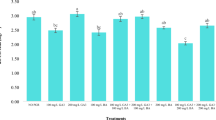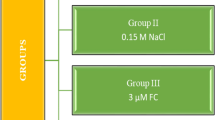Abstract
THE physiological action and practical application of gibberellic acid are well known (H. Seltman, private communication and refs. 1 and 2). Tests were conducted to investigate its possible application to the control of the alkaloid content and plant development of different Nicotiana species. Gibberellic acid was supplied by Eli Lilly and Co. and Merck and Co.
This is a preview of subscription content, access via your institution
Access options
Subscribe to this journal
Receive 51 print issues and online access
$199.00 per year
only $3.90 per issue
Buy this article
- Purchase on Springer Link
- Instant access to full article PDF
Prices may be subject to local taxes which are calculated during checkout
Similar content being viewed by others
References
Stowe, B. B., and Yamaki, T., “Ann. Rev. Plant Physiol.”, 8, 181 (1957).
Parups, E. V., “Influence of GA on the Nicotine Content of Tobacco” (11th Tobacco Chemists' Research Conference, New Haven, Conn., 1957).
Author information
Authors and Affiliations
Rights and permissions
About this article
Cite this article
BURK, L., TSO, T. Effects of Gibberellic Acid on Nicotiana Plants. Nature 181, 1672–1673 (1958). https://doi.org/10.1038/1811672b0
Issue Date:
DOI: https://doi.org/10.1038/1811672b0
This article is cited by
-
Chemical control of flowering
The Botanical Review (1969)
-
Studies in the physiology of tobacco
Proceedings / Indian Academy of Sciences (1965)
Comments
By submitting a comment you agree to abide by our Terms and Community Guidelines. If you find something abusive or that does not comply with our terms or guidelines please flag it as inappropriate.



